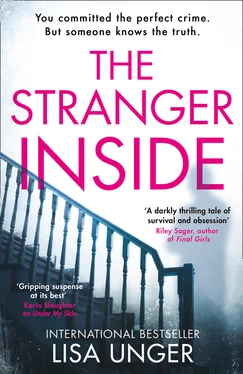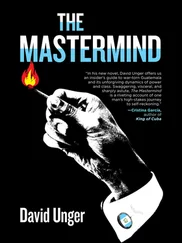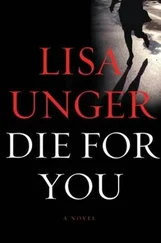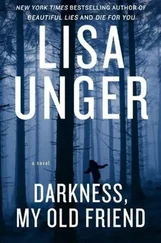That’s how Rain grew up, anyway. Most people seemed to think that kids had lost something, that freedom to roam, to play unfettered. But Rain knew better. Kids lost their freedom for a reason. Because it wasn’t safe to roam.
But they didn’t know that then. They didn’t know anything.
“My mom doesn’t want me to cut through the woods anymore,” said Rain that day, twelve. “She wants us to take the long way around if we’re going to meet Hank.”
She stood on the edge of the road. Here it turned off onto a dirt path that ran between two neighborhoods. The dirt path would carry them over a stone bridge, through a stand of trees, until it let them out by a field. From there it was another five minutes to Hank’s house.
“The street is more dangerous, don’t you think?” said Tess with a shrug. “More cars lately.”
That was true. There was a hairpin turn with one of those mirrors mounted up in the tree so you could see who was coming from the other direction. But there were lots of teenagers driving. They drove too fast, were looking at the radio or at each other, anything but the road ahead. A kid had been struck on his bicycle last summer. He was okay, walked around with a cast for a few weeks. They all signed it.
It wasn’t a hard-and-fast rule, as Rain saw it. More like a mention over breakfast.
Stay out of the woods, okay?
Why?
Mom paused like she did when she didn’t want to answer, looked over to Rain’s father, who was hidden behind the newspaper.
Just listen to your mother, darling. Her father rarely had rules, or chimed in on her mother’s. In fact, if her father ever told her to do anything, it was to question the rules, ask anything, push the boundaries. Believe half of what you see, he was famous for saying. And nothing of what you hear.
“Besides,” said Tess. “It will take forever.”
She was right. It was a long way around, two big hills, an extra fifteen minutes, maybe more. And it was hot. Just before ten in the morning and it was already blazing. They didn’t have their bikes. Tess had a flat and her mom said she’d fix it over the weekend. So they were on foot. The sun was bright, and the creek was babbling. She saw the red flash of a northern cardinal, heard its cry of alarm. It was a fairy-tale forest, a place they knew as well as they knew their own backyards.
“Fine,” said Rain, following her friend onto the path.
No cell phones. Rain thought about that a lot now. If they’d had phones, how would that day have been different? Would she have called her mom? Would their mothers have been tracking them the way people did now? Maybe her phone would have rung just then: I told you to stay away from the woods! Come home this instant!
But there were no phones to ring. Just two girls, twelve going on thirteen. Neither one of them especially cool. Smart, A-students, but naive, sheltered. Tess had braces and enormous glasses, wore her mousy blond hair in braids; Rain, in braces, too, her black hair was wild, untamable. She couldn’t shimmy the rope in gym class to save her own life. Rain already knew she was a writer, like her father. Tess, an accomplished horseback rider, as at ease in a saddle as she was on a bicycle, was certain she was going to become a veterinarian. And Hank, who they were on their way to meet at his house because he had a pool, well, he was just a comic-book, video-game nerd. All he wanted to be when he grew up was a superhero. They were merely waiting for him to get bitten by a spider, or fall into a vat of toxic sludge, and emerge with his powers.
“What’s wrong with the woods, anyway?” asked Tess. She was rail-thin, coltish, prone to tripping. “Since when can’t we walk through?”
Rain looked at her jagged cuticles. She wasn’t clear on her mother’s reasoning. “My mom just said.”
They almost didn’t see him; the big man sat as still as a boulder by the side of the creek. They might have walked right over the bridge and passed him without noticing—if not for the dog.

“Rain?”
She practically jumped out of her skin, adrenaline rocketing through her. Lily whimpered, shifted crankily in her sleep at the sudden movement. Greg stood over her, a hand on her shoulder.
“Did you fall asleep?” he whispered. He lifted Lily from her arms, kissed the baby’s head softly and placed her in the crib. He stood watching their little girl.
Rain came to stand beside him, and he turned to her.
“I’m sorry,” he said. “I shouldn’t have said that. It was a low blow.”
He put his arms around her again and they stood swaying, turtles from the nightlight dancing on the walls.
You were right, she wanted to say but didn’t. It is about what happened. Everything Rain had done since that day was about what happened. How could it not be?
She let the comfort of the room, her husband’s arms, the present moment wash over her. She pushed that day, and everything that happened after, back down into the box where she kept it, and locked it up tight. She envisioned herself throwing the key down a deep well.
Don’t let this slow you down, kid. Her father had issued this directive right after, and at critical moments since. If you let it get its claws into your haunches, it’s over. Remember that.
She’d been running. Fast as she could. Why did she always find herself back there?
“Whatever you want to do,” Greg whispered. “Whatever you need, I support it.”
“Thank you,” she said, holding on to him tight.
But wasn’t there a part of her that wished he’d stop her? That he’d tell her no, that Lily came first, and they’d agreed someone should be home full-time. Wasn’t there a part of her that wished he’d keep her from following that trail into the woods? Again.
They stood there awhile, holding each other, watching Lily, the big, sweet-faced moon hanging from the ceiling watching them. Her eyes drifted outside to the street, where she saw the headlights of a sedan switch on across the street. The car sat idle for a moment, then pulled away slowly. Her heart thumped.
It’s nothing. It’s no one, she told herself. Even though a part of her knew it was a lie.
Do you see me? Do you know it’s me?
He loves you. That’s obvious as I watch you hold on to him, sway in the dim light of the nursery. I shift in my seat, stare at the monitor in my hand, its glow shining blue on the dash, on the door. I’m happy for you, believe it or not. I didn’t think you two would actually get married, let alone stay married. Of course, it’s early days. Still, you seem to get each other. It’s not perfect—I’ve heard the two of you fight, and fuck, make up, argue again. But it’s healthy. It’s real. When he kisses you, I turn the monitor off.
I start the engine and drive away.
You know what I remember about that day, Lara? Everything. Every detail.
I woke shivering because my parents kept that house as cold as a fucking icebox, didn’t even bother turning it up when they left for work. They were both gone, as usual, when I got up.
Remember that feeling? That summer feeling. You open your eyes and there’s absolutely nothing to do. The day stretches ahead, leisurely and beautiful. No school, no responsibilities, no chores in my case—hey, there was a cleaning service for all that—just the blissful freedom of the unsupervised adolescent.
I knew you guys were coming, that we’d swim. There’d be pizza and video games, and some stupid movie. I figured we’d ride our bikes back to your place. Your mom always made dinner; my parents might not come home until eight, carrying fast-food burgers or fried chicken in greasy white sacks—they loved their junk food, didn’t they? Remember how we’d eat that later, too? Eat at your place, eat again at mine. Your dad would come for you, so you wouldn’t ride home alone in the night. Sometimes you’d just leave your bike and get it the next day.
Читать дальше













